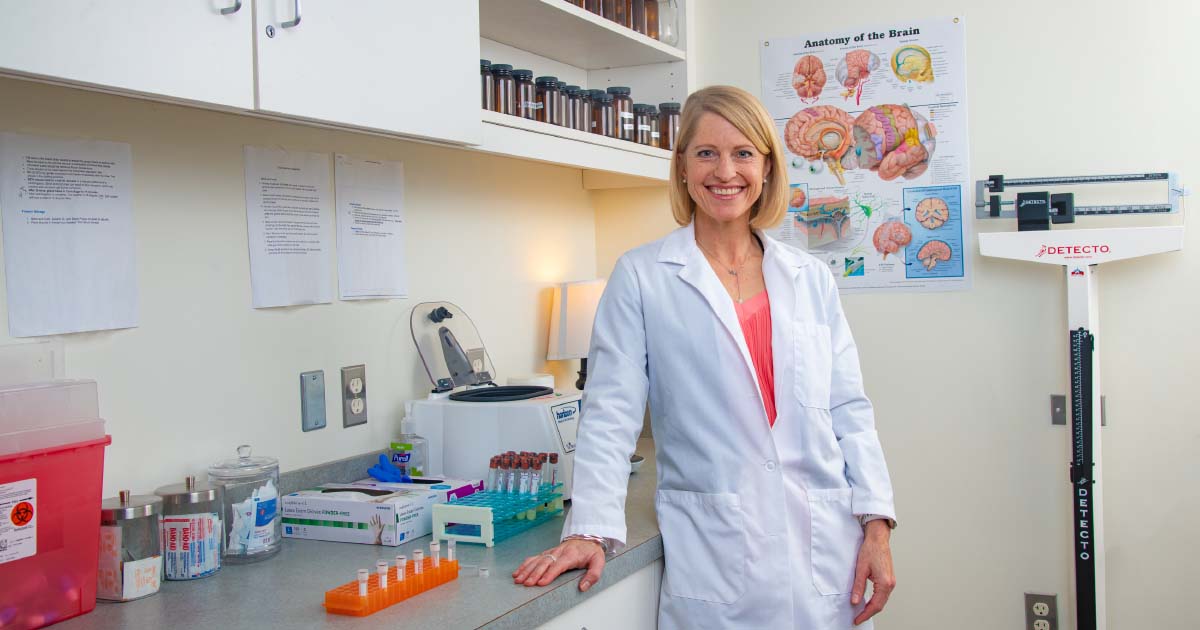Fulbright Awarded to Nutritional Neuroscientist Kathleen Holton
 Photo by Jeff Watts
Photo by Jeff Watts
Kathleen Holton, a nutritional neuroscientist in American University’s College of Arts and Sciences, has received a prestigious Fulbright US Scholar Program award from the US Department of State and the Fulbright Scholarship Board. Holton will conduct research at France’s University of Montpellier during the spring 2026 semester, exploring how diet—especially food additives found in ultra-processed foods—may influence mental health.
The Fulbright Program is the US government’s flagship international educational exchange initiative, designed to increase mutual understanding between the people of the United States and those of other countries. Since its founding in 1946, the program has supported more than 400,000 participants from over 160 countries—selected for their academic merit and leadership potential—as they exchange ideas and pursue solutions to complex global challenges. Fulbright alumni include 44 heads of state of government, 62 Nobel Prize winners, 82 MacArthur Foundation Fellows, and 90 Pulitzer Prize recipients.
Holton’s award reflects American University’s recent designation as an “R1” research institution by the Carnegie Classification system and its expanding reputation for global leadership in science, health, and public policy research.
“Professor Holton’s groundbreaking work at the intersection of neuroscience, nutrition, and public health is exactly the kind of results-driven research we champion in the College of Arts and Sciences,” says Dean Linda Aldoory. “Her Fulbright award underscores the global relevance of her work and our shared commitment to advancing science that improves lives and informs public health around the world.”
The Diet and Mental Health Connection
Holton, a professor jointly appointed in the Departments of Health Studies and Neuroscience, focuses her research on glutamate—a compound that acts as a neurotransmitter in the brain but is also widely used as a flavor enhancer in processed foods. In high amounts, glutamate consumed through additives can overstimulate neurons in a process known as excitotoxicity, which has been linked to a range of neurological and psychiatric symptoms.
In the United States, Holton has developed and tested the “low-glutamate diet,” demonstrating measurable improvements in chronic pain, migraines, centrally mediated fatigue, cognitive dysfunction (including memory, attention, and executive function), depression, anxiety, and post-traumatic stress disorder (PTSD).
Holton’s Fulbright will take her to the University of Montpellier in southern France, where she will collaborate with researchers to adapt and test this diet for use in clinical trials abroad. She says the opportunity represents a unique blend of science and diplomacy. “I am very excited for this opportunity to serve as a cultural ambassador for the United States and the opportunity to work closely with French scientists in our quest to identify ways to optimize the dietary treatment of mental health disorders.”
A Global Opportunity for Impact
Holton’s award comes amid growing international interest in the connection between nutrition and mental health, particularly as concern rises over the global proliferation of ultra-processed foods. In France, researchers estimate that approximately 18 percent of the national diet now consists of ultra-processed items. One large study has already found prospective links between ultra-processed food intake and the later onset of depression in a French cohort, sparking calls for more clinical research.
Holton will work with French collaborators to tailor her low-glutamate diet to French eating habits, identify major dietary sources of glutamate in France, and analyze national data for potential associations between these additives and rates of depression.
Her research could help lay the groundwork for future clinical trials in Europe—and potentially shape how policymakers worldwide think about food regulation, mental health treatment, and the broader role of nutrition in medicine.